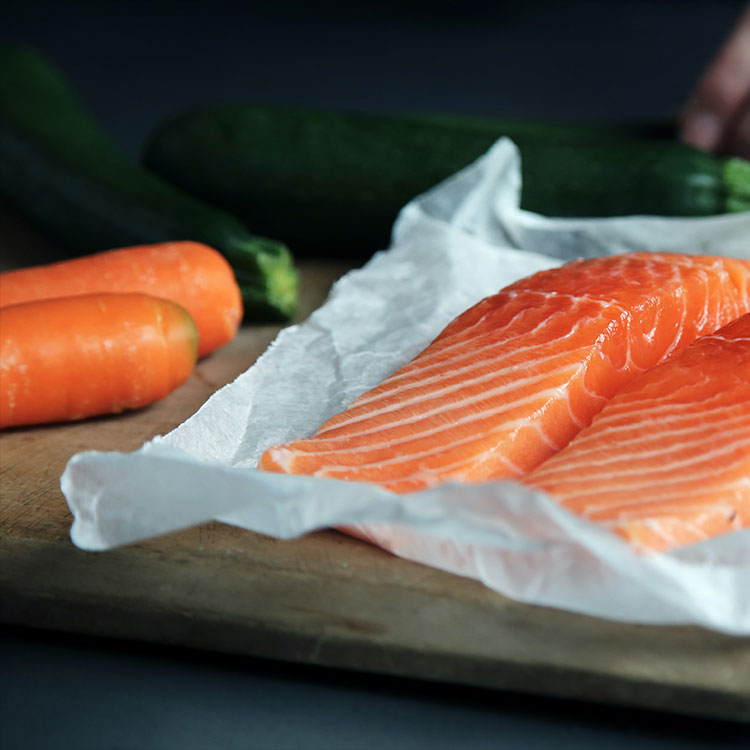Did you know that adding certain nutrients to your diet can help preserve your vision and improve eye health? Research conducted by the National Eye Institute (NEI) confirmed that certain variations of nutrients such as vitamin C, vitamin E, beta-carotene, Omega-3 fatty acids, lutein, and zeaxanthin, and zinc may help preserve vision and reduce the risk of certain eye diseases.
The American Optometric Association (AOA) and the American Academy of Ophthalmology (AAO) recommend the following nutrient-rich foods and healthy eating tips to help reduce the risk of age-related eye damage and support good eye health:
Vitamin C
Vitamin C is an antioxidant critical to eye health. Evidence suggests it lowers the risk of developing cataracts and can slow the progression of age-related macular degeneration when combined with other essential nutrients. Vitamin C also helps the body repair and grow new tissue cells. Good sources of vitamin c include many citrus fruits, such as oranges, tangerines, grapefruit, and lemons. Peaches, red bell peppers, tomatoes, and strawberries also offer excellent sources of vitamin c.
Vitamin A
Vitamin A is another antioxidant essential for eye health. It helps protect the surface of the eye (cornea), making it vital for vision. When combined with other antioxidants, it plays a role in reducing the risk of vision loss from age-related macular degeneration (AMD). Good sources of vitamin A include sweet potatoes, leafy green vegetables, pumpkins, bell peppers, cantaloupe, and apricots.
Vitamin E
Vitamin E is a powerful antioxidant that keeps cells healthy by protecting them from free radicals, which break down healthy tissue. Consuming vitamin E can help aid in the prevention of (AMD) and cataracts. Vitamin E can be found in nuts such as sunflower seeds, hazelnuts, almonds, and peanuts. Other sources include avocados, sweet potatoes, and fortified cereals.
Vitamin B
Research suggests that several B vitamins have a substantial impact on eye health, particularly vitamins B6, B9, and B12. The combination of vitamins B6, B9, and B12 may help reduce the risk of developing AMD by lowering homocysteine levels. Foods that are high in vitamin B includebananas, chicken, meat, beans, fish, liver, pork, potatoes, dairy, eggs, and shellfish.
Lutein and Zeaxanthin
Lutein and zeaxanthin are essential nutrients that aid in the protection of the macula, the area of the eye that provides our central, most detailed vision. Evidence has linked lutein and zeaxanthin to the reduction of the risk of chronic eye diseases, such as age-related macular degeneration (AMD) and cataracts. Sources of lutein and zeaxanthin are typically found in dark-colored fruits and vegetables such as kale, spinach, collards, romaine lettuce, broccoli, peas, yellow corn, carrots, kiwi, mangos and melons. Eggs are also a good source of these nutrients.
Essential fatty acids
Omega-3 fatty acids are essential for proper visual development and retinal function. They also have anti-inflammatory properties, which may play a role in the prevention of diabetic retinopathy (DR). In addition, omega-3 oils can help improve tear function, easing dry eye symptoms. Diets rich in omega-3 fatty acids may also help reduce the risk of developing eye disease later in life. Excellent sources of omega-3 fatty acids include: tuna, salmon, trout, mackerel, sardines, anchovies, herring, nuts, lentils, seeds, and dark leafy greens.
Zinc
Zinc is an essential trace mineral that helps to protect and keep the eyes healthy. Zinc can be found through many sources including legumes or beans such as black-eyed peas, kidney beans, and lima beans. It can also be found in lean red meat, poultry, and fortified cereals.
Consuming a diet rich in these nutrients including plenty of fruits, vegetables, and whole grains is not only important for your eyes, but also your overall health. However, a healthy diet alone is not enough. Individuals should combine a healthy diet with exercise, and regularly scheduled physical exams and eye exams for continued health and disease prevention.
Schedule your annual eye exam today!

